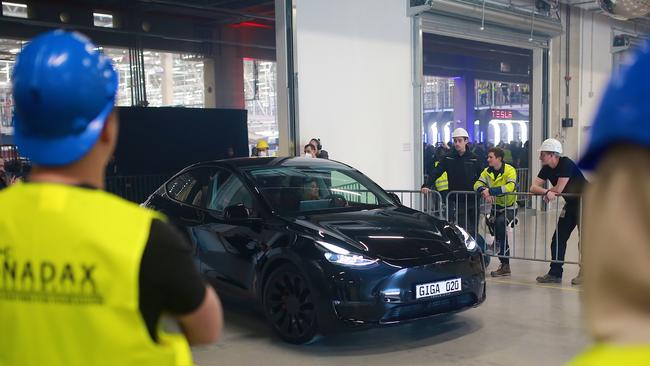Lynas current growth plans ‘will not be enough’ to meet demand
The rare earths miner is looking to accelerate its global expansion, saying sales growth of 50 per cent by 2025 won’t meet market demand.

Lynas Rare Earths is looking to accelerate its global expansion plans to take advantage of rapid growth in demand for rare earths, according to managing director Amanda Lacaze, who says its current plans to expand output by 50 per cent by 2025 won’t be enough.
Speaking on the sidelines of a Melbourne Mining Club lunch on Thursday, Ms Lacaze said Lynas had a number of project teams working on possible expansion projects for the company, as Lynas looks beyond both its Australian and Malaysian operations, and its current expansion plans in the US.
“Our biggest challenge right now is to grow as fast as the market. And so yes, we do have to invest in additional capacity,” she said.
“And we have taken, actually some of our very best and brightest and put them into project teams to work on that. And we expect to brief the market on this within the next three to six months.”
“In 2019 we talked about putting on an additional 50 per cent capacity by 2025. That will not be enough. It will not be enough for us to keep pace with the market. And so that‘s what our team is working on, is how to grow to meet the market.”
Ms Lacaze said she was reluctant to discuss details of Lynas’ potential options, saying the company would only announces plans if it was confident it could deliver on them
But she pointed to Lynas’ overall strategy of building upstream processing facilities close to the company’s resources base – as it is doing with its under-construction cracking and leaching plant in Kalgoorlie in WA – and downstream refining operations close to its customers.
“We haven’t covered all of those areas. The biggest market is East Asia – and Malaysia is a great place to be. But it will not be the only market as the industry continues to develop,” she said.
“Governments all over the world are enthusiastic to find ways to support the development of critical minerals and rare earths – and the reason why is actually the downstream jobs. So if you look somewhere like Germany, for example, you can‘t run an automotive industry without rare earths. Germany has a lot of people working downstream in the automotive industry.”
“I have a big appetite. I have a big vision for this company. We are a global company.”
Ms Lacaze said she was not concerned about the potential entry of new competitors to the rare earths market, such as the recent decision of mineral sands major Iluka Resources to build a rare earth refinery in WA – backed by a $1bn cheap loan from the federal government.
“Markets with many participants are healthier for everybody than markets with few participants,” she said.
“In rare earths, because of the growth, there‘s room for many winners. It’s just that my job is to make sure our Lynas shareholders win more than anyone else.”
But, despite the flood of cash directed at the rare earth sector by governments keen to ensure a secure a rare earths supply chain that is not dependent on China, Ms Lacaze said she has cautioned governments against trying to “pick winners” in critical minerals development.
Instead they should focus on building infrastructure – such as renewable energy micro-grids in regional areas such as Kalgoorlie – that would encourage the development of industry more broadly, and help offset some of the higher costs of manufacturing in Australia.
“I’ve sort of appealed to governments not to pick winners. Although, if they get determined to hand out money, we will be in the queue because at least I can be sure it’s spent wisely,” she said.
“But infrastructure is the thing that really makes a difference. I think there are real live things that governments can do around infrastructure which will allow us to step up and to compensate for some of the cost impost that we have in Australia.”
Lynas shares closed up 11c, or 1.3 per cent on Thursday at $8.97.


To join the conversation, please log in. Don't have an account? Register
Join the conversation, you are commenting as Logout